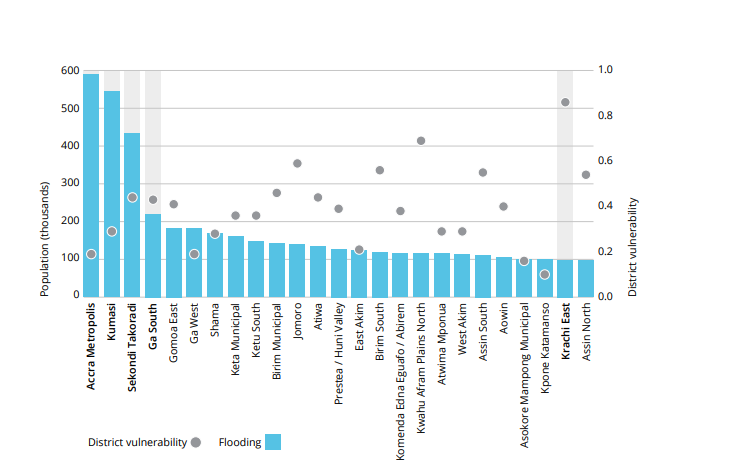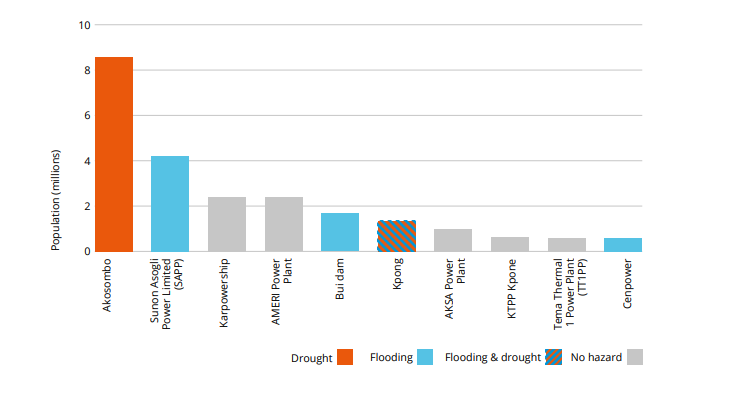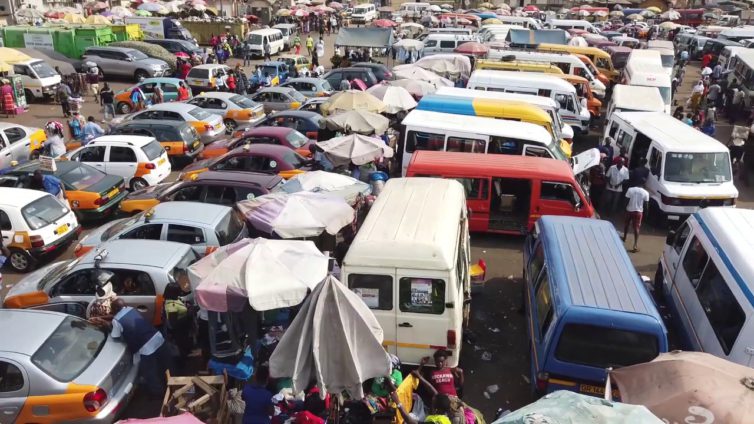
Audio By Carbonatix
A new report has estimated that road flooding could cause damages worth $3.9 billion to the Ministry of Road and Transport by 2050.
According to the study, the potential amount to be lost is thrice the US$1.3 billion investment made in the sector in 2019.
“Using assumptions on rehabilitation costs linked to road types, pavement conditions, and lanes, estimated damages can be calculated, amounting to up to 3.9 billion USD in damages on a national scale in a likely future flooding scenario,” the study noted.
The study titled, “Ghana: Roadmap for Resilient Infrastructure in a Changing Climate” was led by the Ministry of Science, Environment, Technology and Innovation in partnership with the Global Center on Adaptation.
It was based on an assessment of climate change threats to the energy, transport and water sectors.
The research which was conducted using a high hazard scenario, which they referred to as the highest likelihood of flood events found that five districts would be most exposed to road flooding by 2050.
The most-exposed districts; Accra Metropolis, Kumasi Metropolis, Sekondi-Takoradi, Ga South and Krachi East could have a population of 1,885,149 losing access to healthcare in the likelihood of flood events.

“The largest was seen in the Accra Metropolis district within the Greater Accra region, where the estimated damage losses exceeded US 130 million USD. Losses are also high in the Northern and Western parts of the country,” the report said.
In the energy sector, the study concluded that the Akosombo hydroelectric power plant with 1020 MW generation capacity and serving over 8.6 million people, will be affected by exposure to high drought intensity.
The Kpong dam can also be affected by drought hazards in addition to flooding, which can impact its 160 MW generation potential and the 1.3 million people it serves.
The Sunon-Asogli thermal power plant at Tema, which has a generation capacity of 560 MW and serves over 4 million people, is exposed to river flooding hazards and the 400 MW Bui dam is also exposed to river flooding.

It further indicated that the projected impacts of climate change could intensify the pressure on the country’s present dam infrastructure leading to severe consequences for river runoff, which could affect over 1.3 million people, mostly women and children.
However, the study proposed some interventions for addressing risks through targeted adaptation options in the built and natural environments, including nature-based solutions.
The study was carried out under the Africa Adaptation Acceleration Programme, a partnership of the African Development Bank (AfDB) Group and the Global Center on Adaptation, with support from the United Nations Office for Project Services, the United Nations Environment Program, and the University of Oxford’s Environmental Change Institute.
Latest Stories
-
Stop interfering in each other’s roles – Bole-Bamboi MP appeals to traditional rulers for peace
3 seconds -
President Mahama to address nation in New Year message
29 minutes -
Industrial and Commercial Workers’ Union call for strong work ethics, economic participation in 2026 new year message
2 hours -
Crossover Joy: Churches in Ghana welcome 2026 with fire and faith
2 hours -
Traffic chaos on Accra–Kumasi Highway leaves hundreds stranded as diversions gridlock
3 hours -
Luv FM Family Party in the Park: Hundreds of families flock to Luv FM family party as more join the queue in excitement
3 hours -
Failure to resolve galamsey menace could send gov’t to opposition – Dr Asah-Asante warns
3 hours -
Leadership Lunch & Learn December edition empowers women leaders with practical insights
3 hours -
12 of the best TV shows to watch this January
3 hours -
All-inclusive Luv FM Family Party underway with colour, music, and laughter as families troop in to Rattray Park
4 hours -
Jospong Group CEO, wife support over 5,000 Ghanaians with food, cash on New Year’s Day
5 hours -
Life begins at 40: A reflection on experience and leadership
6 hours -
Maresca leaves Chelsea after turbulent end to 2025
6 hours -
NPP still hurting after 2024 loss – Justin Kodua
6 hours -
Ghana declares war on illegal streaming of pay-TV content
6 hours

